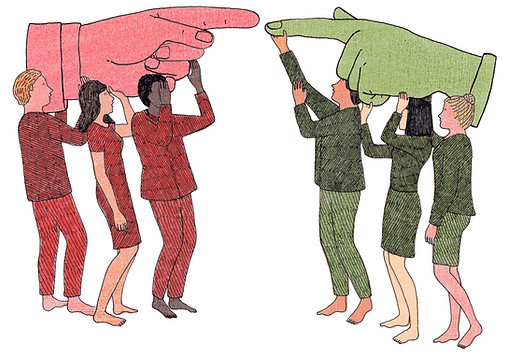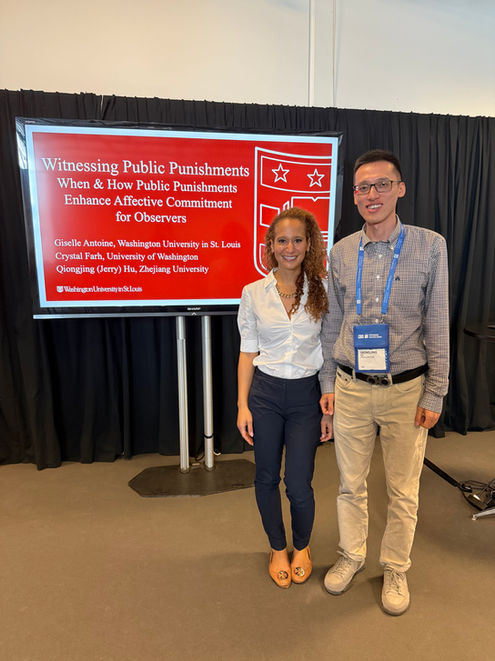Multicultural experiences – such as living, traveling, or working abroad – can have many psychological benefits, including decreasing intergroup bias. However, unlike the intergroup contact literature, research on multicultural experiences has yet to examine whether the valence of these experiences may moderate such outcomes. So, could multicultural experiences actually increase intergroup bias? Five studies reveal that multicultural experiences increase (rather than decrease) intergroup bias when those experiences are negative (rather than positive).
Across multiple methods (recall priming;

virtual reality simulation), and experiences across multiple countries, negative multicultural experiences increased intergroup bias (stereotyping; prejudice) – both to groups associated, and stigmatized groups not associated, with the specific multicultural experience. This increased bias did not extend to ingroup members or non-human targets. The impact of negative multicultural experiences on increased bias was mediated by changes in intergroup ideologies/worldviews – specifically social dominance orientation. These findings reveal how multicultural experiences can be a double-edged sword in our increasingly globalized world.
Food consumption has been conceptualized as an integral aspect of employee well-being. Whereas most research in the organizational literature to date is motivated by individual health outcomes, we assert that eating at work also entails interpersonal implications. In this manuscript, we draw from consumption stereotype theory and suggest that workplace healthy eating affects how employees are perceived and treated at work. Specifically, we posit that workplace healthy eating influences the extent to which a focal employee is attributed the trait of self-control, which subsequently impacts coworker citizenship behavior and social undermining enacted toward the focal employee. Moreover, we postulate healthy eating climate as a boundary condition to the effects of workplace healthy eating—when there is a salient healthy eating climate, workplace healthy eating is a weaker signal in the trait attribution process. Overall, we extend the concept of employee eating to the interpersonal level by explaining how employee eating directly affects coworker interactions.
Selected Work in Progress
The paradox of constraints: When and why people in tighter cultures engage in more deviant behaviors

Cultures vary in the strength of their social norms and the severity of sanctions for violations. Tight cultures enforce strong norms with strict penalties, whereas loose cultures have weaker norms and gentler sanctions. This research challenges a core assumption underlying cultural tightness-looseness theory: that tight cultures necessarily reduce deviant behavior. We demonstrate that in weak situations – contexts with relatively ambiguous norms for proper behavior – individuals from tight cultures are actually more likely to engage in deviant behaviors than individuals from loose cultures.
This effect was found to be driven by heightened psychological reactance to the strict behavioral constraints inherent in tight cultures. Across six studies using archival, survey, and experimental data from a total of 34 countries, we find consistent support for this hypothesis. In an era of tightening cultural environments and rising authoritarianism, our findings serve as a timely reminder that strict rules may inadvertently fuel the very behaviors they are intended to suppress.
“Moral Compression”: A breadth of experiences living abroad narrows the moral gap between loved ones and societal outcasts
People tend to morally prioritize extremely close others (loved ones, such as family and friends) while disregarding extremely distant others (societal outcasts, such as pariahs or criminals). Yet seventeen studies spanning experimental, correlational, longitudinal, and archival methods show that multicultural experiences weaken this moral universal. We find that living in multiple foreign countries elicits a pattern of moral compression: a two-pronged effect of cultural contact where moral concern grows for society’s most excluded and lessens for those closest to us, “compressing” the bounds of one’s moral circle inward. Further analyses reveal that shifts in “identification with all humanity” explain moral compression more so than alternative mechanisms. We also show that greater cultural distance between one’s home and host countries strengthens these effects. We discuss the implications and ethical questions of moral compression — and the possibility for potential tradeoffs in our moral concern for others — in an age that faces increasingly stark challenges necessitating global cooperation.
Itinerants and Isolation: Multicultural Experiences Breed Lone Wolves and Interpersonal Deviance
The current research explores how experiences abroad can fundamentally alter the way people perceive the value social connections at work. Conventional wisdom suggests that a breadth of experiences overseas would inherently expand one’s social network, thereby enhancing the valuation of social relationships. Our findings counterintuitively show that those who have lived in more countries abroad are more likely to eschew social connections and adopt a lone wolf mentality at work. We further show that it is the breadth of living abroad (number of countries lived in) rather than depth (length of time abroad) of living abroad that increases this effect. Finally, the results indicate an important outcome: interpersonal deviance. Across four studies, (N = 1,009), using mixed methods (correlational and experimental) and different operationalizations of key variables, we find consistent support for this hypotheses. Overall, findings suggest that living in many countries may not yield intuitive effects and may even tarnish social connections.
It's not you, it's me: A typology of workplace shaming
Shaming has long served as a powerful tool for social control, yet research has predominantly examined on its impact on targets, leaving the experiences of those who engage in shaming undertheorized and underexplored. To address this imbalance, we first offer a refined conceptualization of shaming and introduce a typology of shaming behaviors, capturing its diverse manifestations in the workplace. We then propose that shaming behavior is driven by a range of self-concerned or other-oriented emotional and relational motives, reflecting the inherently social nature of shame. Finally, we discuss the consequences of shaming, and we notably shift the focus to delineating the underexamined effects for those who engage in shaming, revealing how this behavior can yield both positive and negative outcomes for the shamer.

By exploring these dynamics, our work advances understanding of the complexities of shaming for those who initiate it, shedding light on its dual-edged nature and its role in regulating behavior and maintaining social order within organizations.
FEDERAL RESERVE BANK of NEW YORK
Governance & Culture Reform Conference 2023
Annual Conferences












